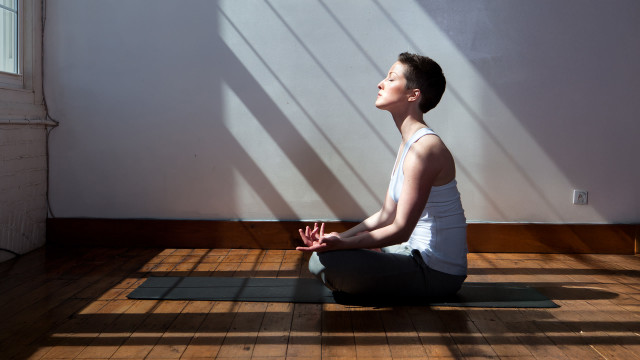When Anxiety Arises, Try This

Of all the emotions, anxiety is one of the most challenging because it involves the experience of losing control. When anxiety takes over, it can feel as if we are powerless to stop it. Just like a strong riptide, anxiety can ultimately carry us away.
Through mindfulness, some of us may be able to improve the uncomfortable symptoms of anxiety by paradoxically turning into a tide and going with it rather than fighting against it.
One of my early mindfulness teachers would use the example of driving a car on a cold winter's day, then skidding on ice. The key is to turn into the skid rather than away from it to regain control of the vehicle. While it feels counterintuitive, embracing anxiety and turning toward it can be helpful.
Before I found mindfulness, I was an anxious wreck. I was out of balance with life and out of touch with my own body. Mindfulness is now my true refuge. Anxiety still arises, of course, but it's never a problem the way it used to be. I can befriend it mindfully rather than panicking and trying to push it away, and as a byproduct, the anxiety naturally runs its course.
Things That May Help You Deal with Anxiety
When anxiety pops up, how can you handle it? Try taking these steps, and you may experience some relief:
Acknowledge it.
When those anxious feelings arise, allow it to be an opportunity to establish some wisdom. Welcome this. There is so much that is not in our control. This is true for us all. In reality, everything is constantly changing; the future is unknown. Therefore, anxiety tends to signify that we have lost the wisdom to know that we can't entirely control our surroundings.
Simply acknowledging and accepting this can naturally bring you into calmer waters. Gently inquire, "What am I trying to control that can't be controlled?" Your anxiety may soften when you find alignment with the truth. Wisely let go of attempting to engineer a particular outcome; release attachment to your solution. In letting go, you are more likely to feel free.
Feel its sensations without resisting or judging.
Next, mindfully ground yourself in the present moment without fixing, resisting, or judging. Allow yourself to feel the sensations of anxiety in the body, not making it a problem. Give it all the space it needs. Sure, it's not pleasant or wanted, but now that it's here, accept it as best as you can and experience what it feels like in the body.
From a mindfulness perspective, resistance and judgment in the mind can feed and increase anxiety. So try to stop and feel it, letting go of the story in mind and allowing the body to lead.
Anchor into your body.
To maintain balance, align with a neutral and balancing "anchor" in the body, including the soles of the feet or the dependable rhythm of the breath. Connect to the earth at that moment, to this breath of life, letting that take center stage.
The key is to radically embrace your anxiety. Attitude and intention are crucial in mindfulness. In relationship to anxiety, mindfulness is never employed as a "fix" or a strategy to make anything go away. This is a radical practice of allowing and being with our moment-to-moment experience, especially when unpleasant or unwanted.
Stop White-Knuckling It
Mounting research backs up mindfulness as a helpful tool for anxious thoughts. Researchers from Johns Hopkins University conducted a review of mindfulness studies and concluded that mindfulness could effectively treat anxiety, perhaps more so than medication.
In my own life, no research is needed. I am a living example. Before I found mindfulness, I did not have the tools to flow with life, which is a constantly moving current into the unknown. I was always white-knuckling it, anxiously clinging to the rocks at the edge. But with mindfulness, I let go and flow with the current at that moment.
Surprisingly, I found myself in harmony with life. It's scary, but it's exciting and liberating. I don't know what's ahead, but with mindfulness, I can feel and find my way through at the moment. I have learned that anything else is insanity.
Releasing the impulse to control everything may help to downshift anxiety. Try this free class, Grounding Meditation for Challenging Moments, by meditation teacher Almeiri Santos, to practice learning how to do so.
Header photo: VisualCommunications/E+/Getty Images









